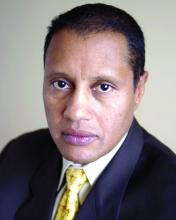User login
Some of us seem completely blank, but our minds are predisposed to constantly engage in various mental activities. Our minds can problem solve, fantasize, remember past events, get preoccupied with a book or movie, pay attention to social relationships and/or pay attention to our relationship with ourselves, focus on what we are doing in the moment, and more.
Many of us understand that our minds sometime operate on more than one level, for example, I can be talking or listening to someone in the “front of my mind” and be thinking something seemingly unrelated in the “back of my mind.” Accordingly, Sometimes we try to take a break from this never-ending mental activity by going to sleep or even taking drugs to “turn our minds off.”
Another important aspect of our minds is “will.” I like to think that most of us are familiar with the concept of “will” and put ours to good use. We intentionally or unintentionally use our wills in various ways – to improve ourselves; have fun; dawdle our lives away on imaginary activities; accomplish something tangible (for example, write a paper or wash the kitchen floor); pay attention to what we are doing in the moment; be healthy; and practice cultivating a “sound mind.”
Many of us would agree that to be of sound mind means having the ability to be comfortable with ourselves; to have some regulation of our emotions and affects; not to worry too much, but just enough to stay motivated; and to apply our minds toward accomplishing a goal we have chosen for ourselves. A sound mind also involves having a good memory, being aware and awake, being able to sort things out and adapt to various difficulties life throws at us, solving problems creatively and effectively, being able to relax, and being able to have a purpose in our lives that we have some success in fulfilling.
As a psychiatrist, I often have been curious about how people use their minds and how they direct their mental activities, or, if they do not direct their mental activities at all and simply meander through their mental lives not doing much thinking about thinking (many of us do both). Further, what is even more curious to me is how we psychiatrists use our minds; after all, we are supposed to be the experts. Certainly, with the advent of psychoanalysis, cognitive-behavioral therapy and other techniques, we are teaching our patients, and, hopefully, learning ourselves about how to manage our minds and what they preoccupy themselves with thinking. Of course, there were the methods of Abraham A. Low, MD, about “will training,” which I consider the first iteration of CBT. Prior to psychoanalysis and Low’s ideas, there have always been various forms of mindfulness.
So, my questions to my fellow psychiatrists are: What are your doing with your mind? Are you wasting it, cultivating it, or doing a little bit of both?
Dr. Bell is staff psychiatrist at Jackson Park Hospital Surgical-Medical/Psychiatric Inpatient Unit; clinical professor emeritus, department of psychiatry, University of Illinois at Chicago; and former director of the Institute for Juvenile Research (the birthplace of child psychiatry), all in Chicago. He serves as chair of psychiatry at Windsor University, St. Kitts.
Some of us seem completely blank, but our minds are predisposed to constantly engage in various mental activities. Our minds can problem solve, fantasize, remember past events, get preoccupied with a book or movie, pay attention to social relationships and/or pay attention to our relationship with ourselves, focus on what we are doing in the moment, and more.
Many of us understand that our minds sometime operate on more than one level, for example, I can be talking or listening to someone in the “front of my mind” and be thinking something seemingly unrelated in the “back of my mind.” Accordingly, Sometimes we try to take a break from this never-ending mental activity by going to sleep or even taking drugs to “turn our minds off.”
Another important aspect of our minds is “will.” I like to think that most of us are familiar with the concept of “will” and put ours to good use. We intentionally or unintentionally use our wills in various ways – to improve ourselves; have fun; dawdle our lives away on imaginary activities; accomplish something tangible (for example, write a paper or wash the kitchen floor); pay attention to what we are doing in the moment; be healthy; and practice cultivating a “sound mind.”
Many of us would agree that to be of sound mind means having the ability to be comfortable with ourselves; to have some regulation of our emotions and affects; not to worry too much, but just enough to stay motivated; and to apply our minds toward accomplishing a goal we have chosen for ourselves. A sound mind also involves having a good memory, being aware and awake, being able to sort things out and adapt to various difficulties life throws at us, solving problems creatively and effectively, being able to relax, and being able to have a purpose in our lives that we have some success in fulfilling.
As a psychiatrist, I often have been curious about how people use their minds and how they direct their mental activities, or, if they do not direct their mental activities at all and simply meander through their mental lives not doing much thinking about thinking (many of us do both). Further, what is even more curious to me is how we psychiatrists use our minds; after all, we are supposed to be the experts. Certainly, with the advent of psychoanalysis, cognitive-behavioral therapy and other techniques, we are teaching our patients, and, hopefully, learning ourselves about how to manage our minds and what they preoccupy themselves with thinking. Of course, there were the methods of Abraham A. Low, MD, about “will training,” which I consider the first iteration of CBT. Prior to psychoanalysis and Low’s ideas, there have always been various forms of mindfulness.
So, my questions to my fellow psychiatrists are: What are your doing with your mind? Are you wasting it, cultivating it, or doing a little bit of both?
Dr. Bell is staff psychiatrist at Jackson Park Hospital Surgical-Medical/Psychiatric Inpatient Unit; clinical professor emeritus, department of psychiatry, University of Illinois at Chicago; and former director of the Institute for Juvenile Research (the birthplace of child psychiatry), all in Chicago. He serves as chair of psychiatry at Windsor University, St. Kitts.
Some of us seem completely blank, but our minds are predisposed to constantly engage in various mental activities. Our minds can problem solve, fantasize, remember past events, get preoccupied with a book or movie, pay attention to social relationships and/or pay attention to our relationship with ourselves, focus on what we are doing in the moment, and more.
Many of us understand that our minds sometime operate on more than one level, for example, I can be talking or listening to someone in the “front of my mind” and be thinking something seemingly unrelated in the “back of my mind.” Accordingly, Sometimes we try to take a break from this never-ending mental activity by going to sleep or even taking drugs to “turn our minds off.”
Another important aspect of our minds is “will.” I like to think that most of us are familiar with the concept of “will” and put ours to good use. We intentionally or unintentionally use our wills in various ways – to improve ourselves; have fun; dawdle our lives away on imaginary activities; accomplish something tangible (for example, write a paper or wash the kitchen floor); pay attention to what we are doing in the moment; be healthy; and practice cultivating a “sound mind.”
Many of us would agree that to be of sound mind means having the ability to be comfortable with ourselves; to have some regulation of our emotions and affects; not to worry too much, but just enough to stay motivated; and to apply our minds toward accomplishing a goal we have chosen for ourselves. A sound mind also involves having a good memory, being aware and awake, being able to sort things out and adapt to various difficulties life throws at us, solving problems creatively and effectively, being able to relax, and being able to have a purpose in our lives that we have some success in fulfilling.
As a psychiatrist, I often have been curious about how people use their minds and how they direct their mental activities, or, if they do not direct their mental activities at all and simply meander through their mental lives not doing much thinking about thinking (many of us do both). Further, what is even more curious to me is how we psychiatrists use our minds; after all, we are supposed to be the experts. Certainly, with the advent of psychoanalysis, cognitive-behavioral therapy and other techniques, we are teaching our patients, and, hopefully, learning ourselves about how to manage our minds and what they preoccupy themselves with thinking. Of course, there were the methods of Abraham A. Low, MD, about “will training,” which I consider the first iteration of CBT. Prior to psychoanalysis and Low’s ideas, there have always been various forms of mindfulness.
So, my questions to my fellow psychiatrists are: What are your doing with your mind? Are you wasting it, cultivating it, or doing a little bit of both?
Dr. Bell is staff psychiatrist at Jackson Park Hospital Surgical-Medical/Psychiatric Inpatient Unit; clinical professor emeritus, department of psychiatry, University of Illinois at Chicago; and former director of the Institute for Juvenile Research (the birthplace of child psychiatry), all in Chicago. He serves as chair of psychiatry at Windsor University, St. Kitts.


